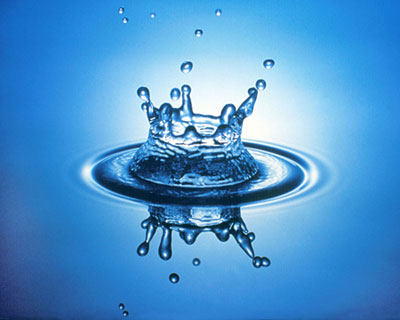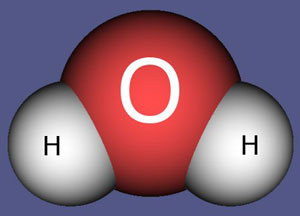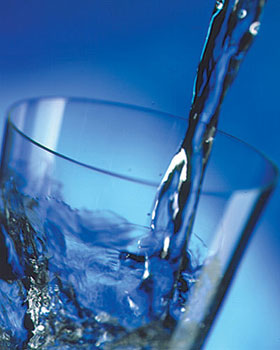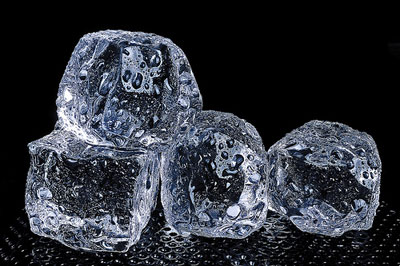Have you thought about the water that you drink?
Is it you who sent it down from the clouds or are We the Sender?
If We wished We could have made it bitter, so will you not give thanks? (Surat Al-Waqi‘a, 68-70)

One of the greatest blessings that man cannot produce despite the availability of all its raw materials is “water.” Allah presents water, which is an essential need for life, as a blessing. We cannot observe the formation of water in a laboratory or produce it. Water came into existence for once and all during when the Earth was first created and presented to living beings. The water that has ensured life on earth since then is the very same water.
Water is a substance with a molecule that contains one oxygen and two hydrogen atoms. In nature oxygen and hydrogen atoms are available in abundant amounts. But these atoms never bind to one another suddenly and form water. Hydrogen and oxygen atoms must come together and collide in order to form water. During this collision the bonds making up the hydrogen and oxygen atoms weaken and unite in order to form a new  molecule, the water. This collision which is essential for the formation of water can only happen in very high temperatures and energy level. Right now such high temperatures that will enable the formation of water is not available on Earth. For this reason the formation of new water molecules is impossible. The water currently available on Earth right now is the very water that was formed during the creation of Earth. However the miraculous properties of water are not limited to these.
molecule, the water. This collision which is essential for the formation of water can only happen in very high temperatures and energy level. Right now such high temperatures that will enable the formation of water is not available on Earth. For this reason the formation of new water molecules is impossible. The water currently available on Earth right now is the very water that was formed during the creation of Earth. However the miraculous properties of water are not limited to these.
The amazing properties of water
Especially the thermal properties of water is essential for life on Earth. Some of these properties are as follows:
Freezing from the Top: All known liquids contract and lose their volumes as their temperatures decrease. When volume decreases density increases and thus their cold parts become heavier. For this reason solid states of liquid substances are heavier than their liquid states. But contrary to all liquid substances, water contract until a particular temperature (+4°C) and then suddenly starts to expand.
When it freezes, it expands even more. For this reason the solid state of water is lighter than its liquid state. That is, according to “normal” laws of physics while ice must sink to the bottom of water, it floats on the surface of water.
This characteristic of water is very important for oceans over the world. If such a property did not exist, that is, if ice did not float over water, much of the water over the world would freeze, putting an end to the life in lakes and seas. Latent heat: When ice melts or water evaporates the water surrounding it withdraws. In a contrary situation it gives out heat. This is the concept known as “latent heat.” All liquids have their respective latent heats. However the latent heat of water may be considered as the highest of all liquids. This aside the “thermal capacity” of water, that is, the amount of heat necessary to increase the heat of water by one degree is higher than the majority of other liquids.
Latent heat: When ice melts or water evaporates the water surrounding it withdraws. In a contrary situation it gives out heat. This is the concept known as “latent heat.” All liquids have their respective latent heats. However the latent heat of water may be considered as the highest of all liquids. This aside the “thermal capacity” of water, that is, the amount of heat necessary to increase the heat of water by one degree is higher than the majority of other liquids.
The property of balancing heat difference: The fact that latent heat and thermal capacity of water are much higher than other liquids make seas warm up and cool later than lands. For this reason the temperature differences is around 140°C between the hottest and coldest places on Earth. The temperature differences on seas, on the other hand, vary at most 15-20°C.
Property of transmitting heat: The ability of water to transmit heat is at least four times greater than any other liquid. The thermal conductivity of ice and snow, on the other hand, is low. This property of water has a very important function. Ice scarcely transmits the cold to the water layer below. This way even when the weather outside hits -50°C the ice layer above the sea does not exceed 1-2 meters. Thus seals, penguins and other polar animals can drill the ice and reach the water below.
By means of these thermal properties of water the heat differences between winter and summer or night and day remain in-between certain limits that make the survival of human beings and other living beings possible. If, compared to lands, the amount of water over the Earth were less, the heat differences between night and day would be much higher, the majority of lands would turn into deserts, making life impossible on Earth.



